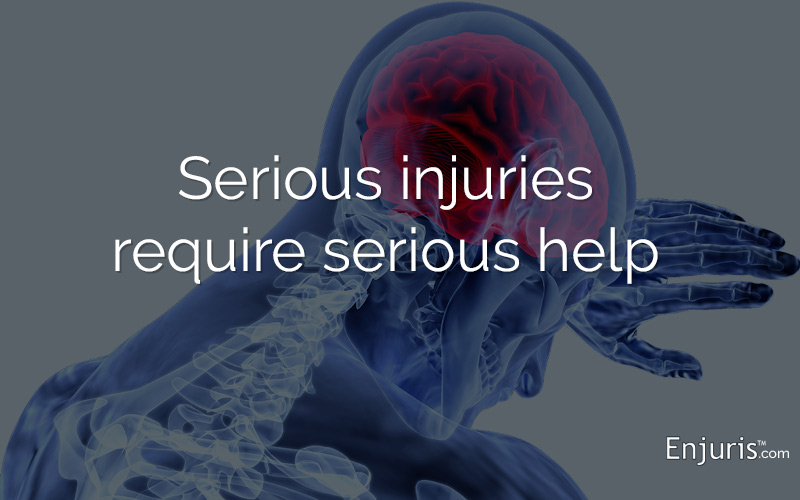Recover the compensation you need to help you improve your quality of life
Serious injuries to the head or brain often leave behind devastating consequences: paralysis, permanent brain damage, a decrease in quality of life or even death. Symptoms of these injuries may not show up for days or weeks after an accident, and the damage could be irreversible by the time a diagnosis is made. It’s important to pay attention to the warning signs of a head or brain injury, and a trip to the doctor is encouraged even if you think you feel fine.
Recovery from a head injury or traumatic brain injury (TBI) typically requires extensive medical care and months or years of rehabilitation and emotional recovery. It’s scary to anticipate the costs for this kind of medical care and you may worry about making ends meet.
Knowing where to turn in the face of these serious injuries is the first step on the road to recovery. Here, we'll take a look at some of the characteristics of a head or brain injury, what to do if you or your loved one has experienced such an injury and how you may receive compensation to help.
Head and brain injury fast facts
Unfortunately, head injuries and TBIs are more common than you may think. The Brain Injury Association of America (BIAUSA) provides the following eye-opening facts:
- 1.4 million people suffer a TBI each year
- 50,000 TBI victims die, while 235,000 are hospitalized annually
- The leading cause of both head injuries and TBI is car and truck accidents
- The leading causes of TBIs are: falls (28%), motor vehicle accidents (20%) and accidental collision with an object (19%).
TBI is defined as any significant jolt or blow to the head that interrupts normal brain function. Thus, these accidents can happen in a variety of settings.
Symptoms of a head or brain injury
Though a headache is the most obvious sign of a head or brain injury, not all warning signs are as easy to spot. Some symptoms may go on for months without anyone even noticing the change in health or behavior. Common symptoms of head and brain injury include:
- Dizziness
- Vomiting
- Difficulty speaking
- Indifference or seeming detached
- Depression or irritability
- Changes in personality
- Nausea
- Numbness in body parts
- Losing consciousness
- Changes in vision
- Confusion
The above symptoms can indicate a host of health problems and potentially serious illnesses that may or may not be connected to a head trauma. If you or a loved one demonstrate any of the above symptoms, a trip to your primary care doctor or the emergency room is strongly encouraged.
Who is liable for my head or brain injury damages?
If you or a loved one is suffering from a head or brain injury, the medical bills are probably piling up. The accident victim is likely to have lost a lot of workdays, too, if they’re even well enough to return to their job.
You can recover damages to compensate for your brain injury in 3 situations:
Workers’ compensation
Workers’ compensation is available for anyone whose head or brain injury came from a workplace accident. Georgia workers’ compensation benefits are comprehensive, but the proper filing and documentation must occur in order to receive a settlement.
In some cases, a hearing may also be needed to prove the cause of your injury and the extent of your physical limitations or pain. We encourage you to speak with a workers’ compensation attorney in order to maximize your potential recovery.
An accident or negligence lawsuit
Accident or negligence claims are perhaps the most common method of recovery for damages covering head or brain injuries. Here, someone else unintentionally caused your harm that contributed to your injury. Though car accidents are the most common example, slip and falls, medical malpractice, insufficient supervision and product liability are all potential causes of head and brain injuries.
Georgia is a modified comparative fault state. This means that someone needs to have been at least 51% responsible for your accident in order for you to receive compensation. For these cases, a Georgia personal injury attorney will evaluate a claim and help you decide if you should settle or pursue litigation.
Criminal activity
In particularly tragic cases, someone may have been trying to hurt you or a loved one. Domestic violence, assault, rape and attempted murder are all crimes where a victim may have suffered a head or brain injury. The case itself will be a personal injury case like an accident or negligence claim, but the cause of action is called an “intentional tort”.
Punitive damages are also possible in these cases to punish whoever caused you harm. As the police report, criminal trial and other evidence may contribute to a higher payout for you, we encourage you to consult a personal injury attorney for these cases as well.
Damages available for head and brain injuries
Since head injuries and TBIs often cause permanent damage, lifelong damages are commonly awarded for victims. The payout is typically substantial, as well, in or order to cover the costly medical treatment, rehabilitation and lost income. In Georgia, damages are divided into two categories: special and general.
Special damages are economic damages associated with monetary loss or expenses. The totals are easy to calculate, and the bills are easy to verify. Some examples of special damages include:
- Current and future medical expenses
- Lost wages and time at work
- Property damages
- Funeral costs in the case of a wrongful death claim
General damages refer to non-economic losses. These losses are for things that don’t have a price tag. The totals aren’t obvious, and Georgia allows the jury to decide on the reasonable costs for these damages. Some examples of general damages include:
- Pain and suffering
- Emotional trauma
- Loss of quality of life
- Loss of companionship in the case of a wrongful death claim
A Georgia personal injury attorney or workers’ comp lawyer will be able to help you sort through all of your expenses and explain which damages you’re likely to recover.
Additional resources for accident victims
Suffering from a head injury or TBI is certainly a traumatic experience. Additional support is available to you throughout Georgia and we encourage to contact these organizations to help you on your journey to recovery.
Resource for research and treatment options regarding brain injuries.
Resource for symptom identification, treatment options and advocacy for those with brain injuries.
Charity resource for information, advocacy and support.
Resource for treatment options and research news for those suffering from spinal cord injuries.
As brain injuries can also lead to paralysis and other disabilities, here are some other Georgia resources to consider:
This non-profit organization serves Northeast Georgia with training in life skills, and provides support and resources for all aspects of disabled life.
Serving Middle Georgia, this non-profit provides new lifestyle training and resources for the physically handicapped.
Largely an advocacy organization, the office also provides resources for the both the disabled and their caregiver.
See our guide Choosing a personal injury attorney.


